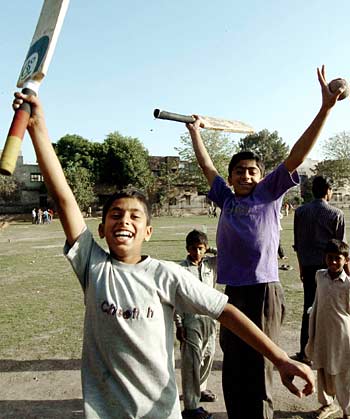
|

Passions are aroused easily, but opinions can be changed when role models take a stand
© AFP
|
|
Cricket diplomacy has become something of a specialty for Pakistan's military rulers. President Pervez Musharraf followed closely in the footsteps of President Zia-ul-Haq by seizing the opportunity of a Pakistan tour of India to further the peace process. Musharraf's and Zia's ideologies may differ, but their tactics are the same.
Two factors are helping Asia's keenest rivals to normalise relations. The first is the leadership of two non-politicians. Second, but no less significant, is cricket, which has been entwined in political processes in various guises, from the socio-political transition of the Caribbean to the destruction of apartheid, from the mischief of Bal Thackeray to the mischief of Norman Tebbit.
Today, the political dimension of cricket faces its most serious challenges in Zimbabwe -- a challenge we appear to be unequal to -- and in South Asia, where sport's power to transcend politics has been reaffirmed over the past weeks. Once again, this has been a gripping series with many memorable moments. But the moment of the series for me came at the end, almost the final act. Pakistan had won the one-day series, and Rahul Dravid had to explain himself to Ravi Shastri in front of a ridiculous number of dignitaries on the podium and a surprisingly large crowd.
It is hard not to be impressed by Dravid -- and let's put his batting prowess to one side for a moment. He articulately handles the media with assurance and honesty, skills that the massed ranks of VVIP podium-huggers would do well to acquire. On this occasion, though, Dravid excelled himself. With the interview clearly over, Dravid hogged the microphone to thank Pakistan for touring India, playing in the right spirit, making friends, and being great ambassadors for their country.
Unfortunately, Inzamam-ul-Haq's brain was not quick enough to repay the compliment -- although he must surely wish he had. But Dravid, a true Indian hero and probable next captain, did more with those few well-chosen words to bring the nations closer together than any of the sixes, wickets, or politicians' handshakes that occurred throughout the series. When a national role model shows that friendship is more important than animosity, it is hard for millions of impressionable cricket fans not to follow.
Pakistan's players played their part too, justifiably thanking the Indian crowds for their support and affection throughout the series. And just as the behaviour of Pakistan's crowds had been a pleasant revelation last year, so was the behaviour of the crowds in India. In 1999, when Pakistan last toured, the early example of sportsmanship set by Chennai's cricket watchers was disappointingly ignored by the crowds in Delhi and Calcutta. No such disappointment on this occasion, as India showed that it could match Pakistan's hospitality to a once-hostile neighbour.
So where does this feelgood factor lead us? It leads us to learn that as neighbours we can compete with maturity. It leads us to learn that we are more alike than we are different, something we once knew but had forgotten. It leads us to learn that cricket has a unique power in South Asia, a power that can be harnessed for peace by cricketers, officials, and politicians. It leads us to learn that the rivalry of India and Pakistan is at least as important, gripping, and essential as the rivalry for the Ashes. It leads us to learn that we prefer watching our cricketers battle ahead of hearing our politicians sabre-rattle. It leads us to learn that cricket is like a dialogue -- and India and Pakistan need to keep talking. And, it leads us to learn that Rahul Dravid has turned a cricketing defeat into a diplomatic victory.
Kamran Abbasi is a cricket writer and deputy editor of the British Medical Journal
